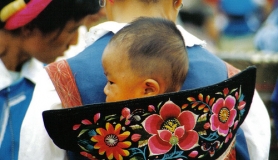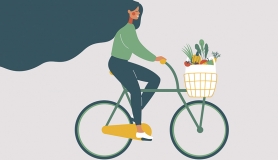Mary Montessori suggested that the child between the ages of 12 and 18 was best suited to an Erdkind (Erdkinder means Earth Children in German). This school was primarily land based and the education provided was teaching the students about the day to day running of the farm. There was a decrease in academic rigour and the child was set to work in the field. Of course, we can’t all let our children loose as farm hands as soon as they hit 12, nor can we necessarily lay off the need set by the education department for them to study hard. Ironically, this is the age where children are required to sit GCSE’s or Baccalaureates or other tests and exams. In other traditional cultures children entering their teen years are sent on quests or required to fulfil tasks. Inuit boys are sent on a vision quest and for many African tribes they celebrate their teenager’s passage into adulthood by sending them on their first game hunt.
In contrast, however, in the UK we have our 12 – 18 year olds shut away in classrooms for seven hours a day, studying feverishly for exams that will potentially map out their future possibilities. Climbing trees is replaced with homework and our teenagers spend a good portion of their school day learning things because they are in a government written curriculum and not because they are necessary to become a healthy and successful adult. I’m not saying that we all home educate or that school is not a good place. On the contrary, there are many added benefits of school that cannot be replaced. However, what is important is supporting our teenagers, understanding what is happening to them and knowing how to help them grow into secure and confident adults regardless of their exam results.
FINANCIAL INDEPENDENCE Responsibility is highly important during this period. It is of great value for teenagers to know they are worthy and part of a community. Giving teens the chance to make money and budget for themselves and/ or their family is empowering. Being able to solve quadratic equations is not going to help your child manage his or her bank account. Depending on your teenager to buy the week’s shopping or plan and cook some of the family meals will encourage growth and self-worth. Friends of ours with three teenage boys have developed a way for their boys to become responsible and budget by no longer providing pocket money for them. The boys now have to find holiday work and, if they want to buy something new, they have to sell something they no longer need in order to fund this new purchase. Whilst this scheme may not work for all, it certainly fosters Montessori’s idea of cosmic education. Learning the intricacies of online selling and how much harder it actually is to sell second-hand things in order to pay for the latest gadget, may make the new purchase better thought through. This in turn could reduce consumer waste by creating deeper differentiation between ‘wants’ and ‘needs’.
PLANES OF DEVELOPMENT
Montessori wrote about the planes of development, of which there were four: birth to six years, six to 12 years, 12 – 18 years and 18 – 24 years. In 21st century Montessori education in the UK, we appear to know most about the first plane and a little about the second. However, once your child reaches 12, the art of educating a child consciously, be it through the Montessori method, Steiner method or home education tends not to be so widely written about or discussed.
Montessori discussed the changes that took place within the child from the ages 12 to 18; the fact the child is entering puberty and with this comes changes in emotion and mood. This is not too dissimilar to the birth to six years plane of development where the child enters and leaves toddlerhood. There will be mood swings and an inability for the child to express their true feelings. There is a physical period of growth and, much like the toddler who may be unable to vocalise their feelings, teens are unable to express themselves because, frankly, these are new feelings, comprising of hormone shifts and uncontrollable mood swings.
SUPPORTING A CAUSE
The child in the 12 – 18 year period is often drawn towards a cause. They have lots to say and lots to work out. It is important that their feelings are heard and justified. I remember being incredibly wrapped up in the World Wildlife Fund during my teen years and having friends who were similarly engaged in Amnesty international or the anti-Apartheid movement. Exposing your teenager to different charities and causes gives them the opportunity to explore this tendency.
Enabling a teen to have access to groups such as the scouts or Woodcraft Folk encourages social cohesion, grace and courtesy. This period is a time for cooperation and building social networks: think youth groups, drama, music clubs… Opportunities for working as a team will support these innate needs as well as fostering the skills needed to listen to the opinions of others, be courteous and develop leadership skills.
CAMPS FOR TEENAGERS
In the UK we don’t put the same emphasis on summer camps as they do in the US, but their value for teenagers may be significant and many work on the childcare voucher scheme. Our boys have been going to a small family run camp for the past couple of years now. We feel they have benefited from the outdoor activities, the fact they are sometimes pushed a little out of their comfort zone and the fact that the groups are small, the food organic and the principles similar to our own. There are many other summer camps that work along similar lines. Critical thinking and logic skills are a crucial part of this stage of development, therefore learning to build bivouacs, or a team building exercise making a raft or a pedal car will exercise their ability to think outside the box, infer, deduce and hypothesise, as well as being an excellent tool for team work. We are grateful to have found a school for our boys that supports our own feelings that a child needs access to the outdoors and nature. Both boys have weekly outdoor learning classes during which they learn about herbs and plants; they have access to the school’s smallholding which housed pigs and a cow last year, all of which ended up in the school kitchen, but not before the students had learned some basic animal husbandry.
ADULTS OF THE FUTURE
In parallel to Montessori’s writings on ‘normalisation’ of the young child in the nursery, is the need to normalise the teen. From the tree of independence springs the branches of self-esteem and self-worth. Both these sub categories of independence create a teenager who becomes able to fend for themselves, is able to socialise with others and able to proceed to the next stage of development, becoming the adults of the future. As a mother to two teen boys and a mother to a future teen girl, I know that we will not always see eye to eye. I know there will be times when their music drives me crazy; times when the fact they are eating breakfast at 11am when I’m preparing lunch will be annoying. What I do know though is that we will seek to work with them through the teenage years. We will encourage them to be outside, to help us on our little homestead, to go on that 10 mile hike without anything but a compass, to be a part of the drama society at school or the cycling club.
We will aim to give them the same freedoms within limits afforded a four year old in the Montessori nursery class: the freedom to speak and be heard, the freedom to explore, the freedom to create, the freedom to ‘not do’, the freedom to repeat without interruption. We will aim to listen to their feelings on emotive issues but also give them their need for space and non-interference. Just as the directress of the Montessori primary class evolves from ‘the teacher’ to the role of observer and onlooker but is always consciously present, so we hope to do the same for our teens.
Rachel lives with her family on a small homestead in Oxfordshire. She is a part time Montessori teacher and writer. She blogs at athomewithmontessori.blogspot.com when she has the time
ALTERNATIVE SCHOOLS Oxford Montessori school oxfordmontessori.co.uk
Trefoil, Sussex (only goes up to 13 so not a true Erdkinder but run on land based principles) trefoilmontessori.co.uk
Hershey Montessori Farm School, Ohio (the only real Erdkinder is in the US) hershey-montessori.org
WANT TO KNOW MORE? montessorisociety.org.uk montessorieducationuk.org montessori.org.uk







